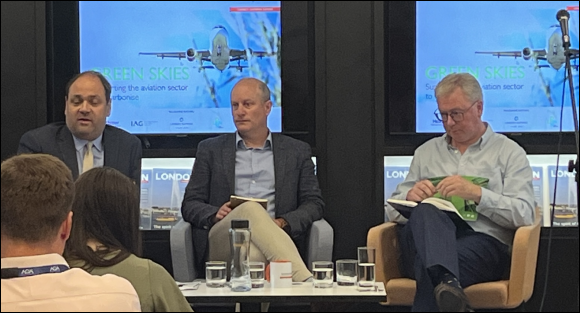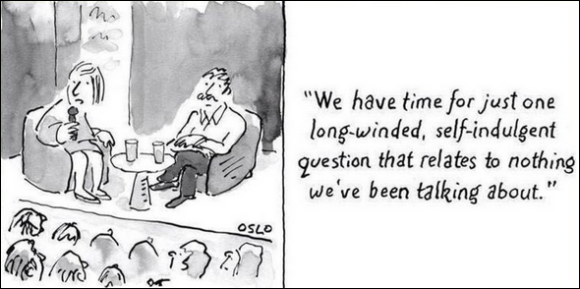What can you really achieve as a public speaker? If you’re lucky or skilled or both, you may be able to connect with your audience and leave them better educated on the issue of the “Three Big Rocks” and avoid the problems of the “Condom Test”.
In the UK, the typical audience member will remember only three things. At the end of seminars I have a habit of asking some of the ordinary audience members “what are the three things that stood out from that talk”? On one memorable occasion (many years ago) I was an ordinary delegate at an upmarket event in the posh part of Berkshire, and I remember afterwards asking three people in succession about the “Three Big Rocks”. Each and every one of them failed to articulate even one single message that the seminar had sought to deliver. I don’t know if that was a failure of the speaker, the delegates, or the UK education system.

On Thursday 7 September 2023 I went to the “in-person” launch event of the UK Green Skies Report. It appears that the “Three Big Rocks” philosophy is something unfamiliar to the chair, the moderator, and the experts on the panel. In most presentations, the audience will remember the first thing you said, the last thing you said, and will forget everything in the middle. For this reason I open my speeches with the “Three Big Rocks”, and close them with the “Three Big Rocks”. In the middle I tend to expand the discussion of each key issue, and attempt to avoid the introduction of any new material which is tangential to my objectives. If I want my audience to remember one thing, then that one thing gets headline billing at the start and the end of my talks.
I have a style guide for my speeches and it starts with “when I get to the end of this meeting, how will I know if I’ve had a good meeting”? My early draft of any presentation then lists the “Three Big Rocks” that I want to focus on. I have objectives, written down in black and white. Once drafted, I apply the “Condom Test” to my scribbly notes.
If you have ever worked in marketing, you may already know about the “Condom Test”. Take any piece of marketing copy, remove the name of the product (say) “Time Machine” and in its place substitute the word “condom”. It works like this . . .
“Our time machines put you in control of your own destiny.”
. . . becomes . . .
“Our condoms put you in control of your own destiny.”
If the sentence still makes sense, in ordinary English, then the sentence is telling the consumer nothing about your product. It’s word soup. It’s a collection of wasted space on a page. It’s a missed opportunity to educate your prospect about the value of your offering, and instead bore them to death with platitudes.
I tried the “Condom Test” on the first couple of pages of The Green Skies Report. For example:
Government should heed the advice of industry experts and public bodies and introduce price support schemes, such as a Contracts for Difference scheme, for Condoms, to provide price stability to the market and support inward investment into a domestic Condom industry.
That sentence still makes sense, in ordinary English, and tells the reader nothing about the product, only that there is a desire to conduct political lobbying, but the validity of the “should” statement has not been articulated.
Had I written it, it would have said something like:
There are compelling reasons why the Government should implement these three industry panel recommendations:
- Recommendation A – Reason 1, 2 and 3
- Recommendation B – Reason 1, 2 and 3
- Recommendation C – Reason 1, 2 and 3
No platitudes, three big rocks, each backed up with three reasons!
This particular “Green Skies” event was attended by a few dozen industry insiders, and a couple of dozen industry outsiders. As an outsider, I felt lost within minutes of the start. The chair began with “we are delighted to be delighted today about delightful things and this delights us”. No big rocks yet!

The moderator then asked the first panel expert a question which was six questions in one, to which the panel expert replied “that seems to be six questions in one”. No big rocks there either! At the start of the discussion there was no meaningful introduction of the subject, certainly nothing that would have educated an industry outsider, and there was no opportunity for either of the experts to have (say) 60 seconds to introduce themselves.
A bad start was followed by a short formal discussion, mainly about lobbying and about how allegedly “brilliant” the UK is on the subject of “condoms”, and that lasted only 15 minutes. I for one did not have time to pick up the report beforehand and read it, and I was surprised that the short discussion omitted any clear indication of what the report said. It was an exercise where three people on stage engaged in mutual back scratching. I also gained the impression that they thought everybody in the room was an aviation expert and/or sustainability expert. The ordinary Joe Public was completely overlooked. There then followed a very long Q&A with the audience. Some of the questions were not questions. A two way dialogue between Panel Expert A and Overt Insurance Lady enabled her to say “insurance” several times.
When BigWig in the audience (from BigCo Airline) hijacked the discussion and started a long-winded comment, not a question, followed by a two way self promotional dialogue with the moderator, I pictured in my head this cartoon which I have often seen in the past:

In this case, it was more a long-winded, self-indulgent non-question, tangentially on topic but designed to raise the profile (and improve the public perception) of BigCo (which has a bad reputation). I walked out when it became clear that BigWig was not being shut down, and was getting more than his fair share of air time. This was not an audience Q&A session, but a sales fest for unashamed boasts.
The “Three Big Rocks” is a concept which Stephen Covey introduced in his book “The 7 Habits”. Today, what were the “Three Big Rocks” that the organisers wanted the audience to take away? I have no idea! This was not a presentation for an audience, and certainly not for an audience of outsiders. It was an industry event staged for the purpose of preparing a press release which in the next few days will be touted around national and international press outlets. That’s what lobbyists do. And I had been caught in a trap which I ought to have foreseen. They wanted press coverage, and they demonstrated little interest in providing informed debate for the delegates.
The biggest rock I took away from that talk is that I won’t be going back again.
